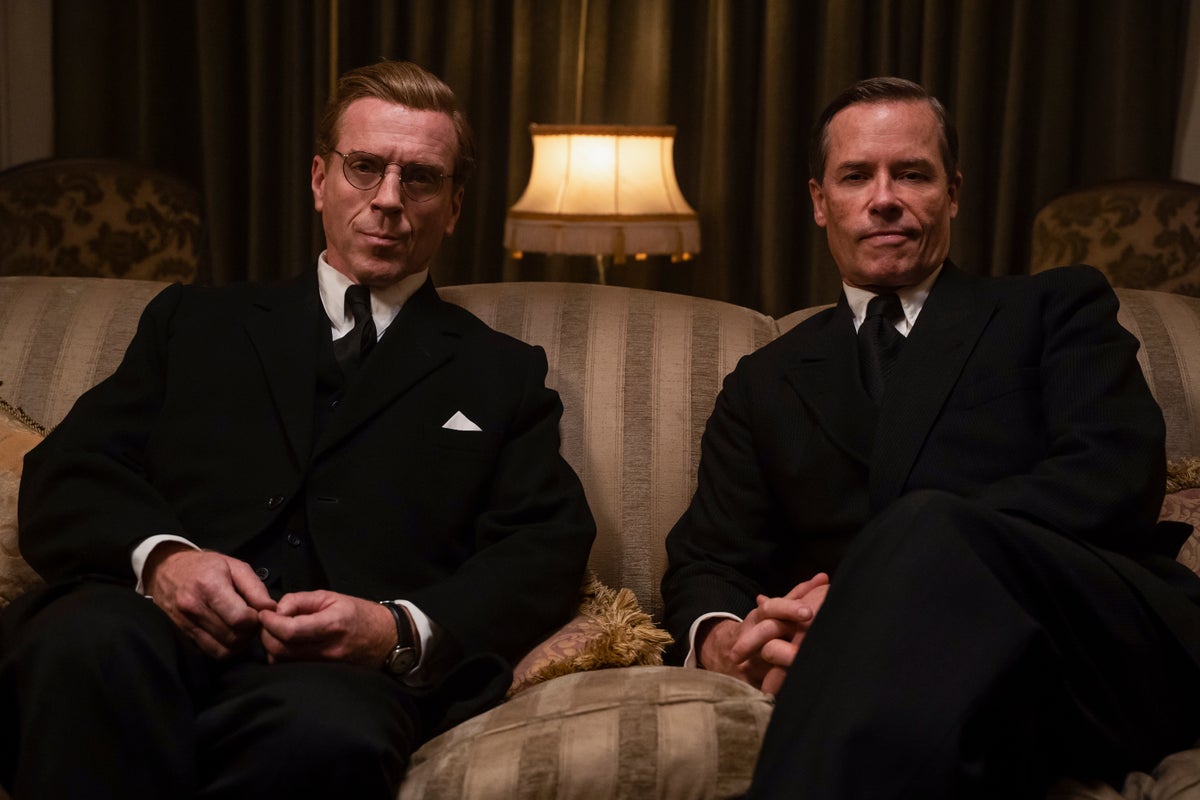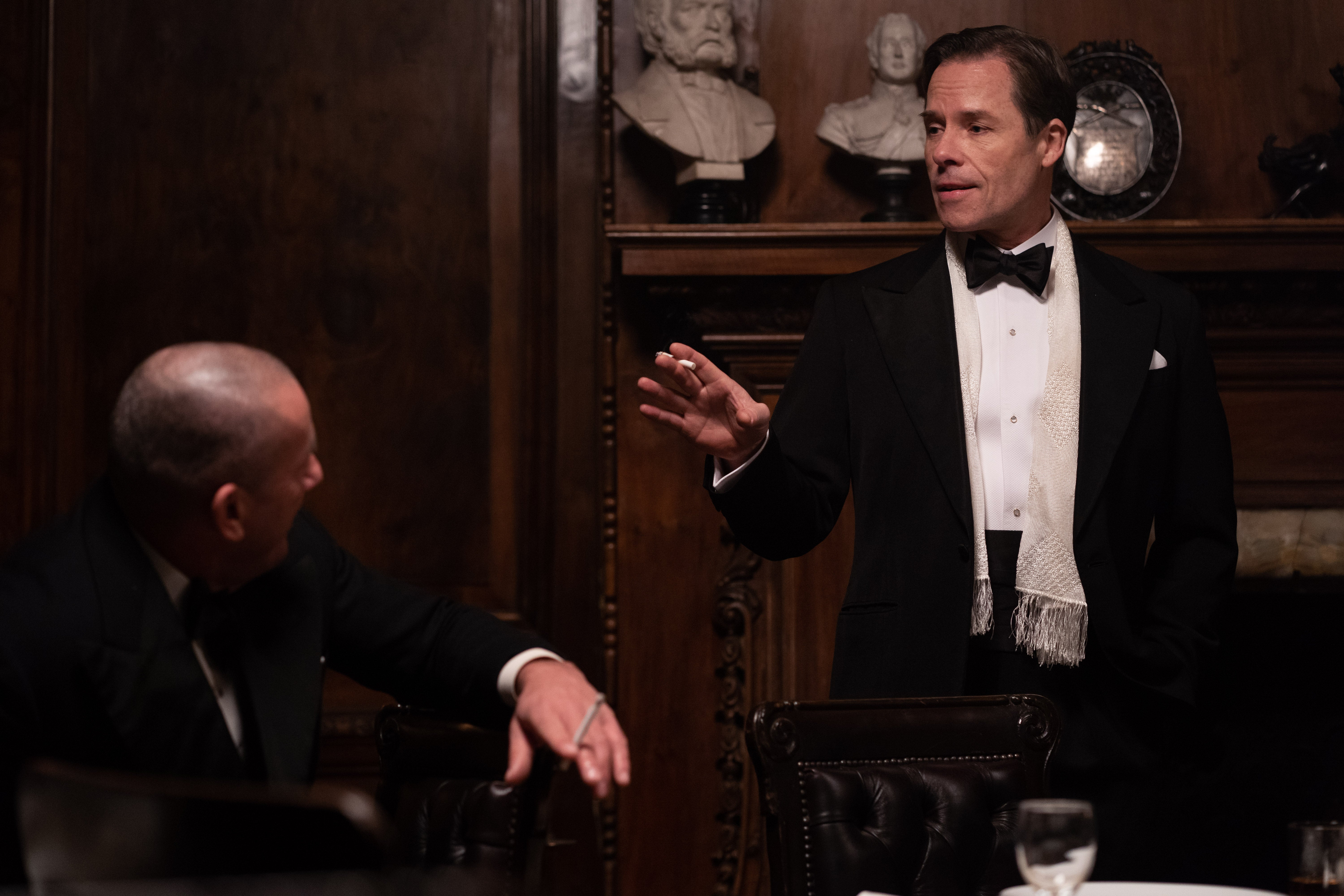
Ever since his defection to Moscow in 1963, the name Kim Philby has been a byword for treachery and betrayal. Now the incredible story of the most damaging spy scandal in British intelligence history is explored via a fresh lens in six-part ITVX drama A Spy Among Friends. Starring Guy Pearce as the charming, ruthless Philby, and Damian Lewis as his closest friend, and fellow MI6 agent, Nicholas Elliott, who finds himself under suspicion when Philby flees to Russia for a life in exile, the show brings to light a new, very personal side of the Philby affair and the complex, fluctuating politics of the time.
To find out more about this fascinating tale of two spies, we spoke to the show’s executive producer Alexander Cary and author Ben Macintyre (who wrote the bestselling book on which the series is based) about how they brought this compelling story to life on-screen…
How did the A Spy Among Friends series come about?
BM: I met Alex going on for eight years ago and we clicked immediately. I could just tell that he ‘gets’ this stuff. And it is complicated, these kinds of stories are not straightforward, they are all about nuance.
AC: I was a huge fan of Ben’s books. My dad gave me Operation Zigzag for Christmas one year, and then when we were doing Homeland, A Spy Among Friends was of interest to us. Later I would go and play squash every day, and there was this older guy there on a Tuesday who had the court before me, so we would chat. Then he looked me up and realised that I was a writer, and I learned that he had been a big book agent at CAA. Then he called me one day out of the blue and asked if I’d be interested in adapting A Spy Among Friends. Of course, I said yes immediately. Then I thought, ‘Oh f– how do I do this?’
BM: I was involved with Alex in the writing. I mean he’s the writer, but at every stage, Alex consulted me on details, language and precision and believability. They’re very, very good producers and they take this stuff very, very seriously. Alex was absolutely determined that this was going to be thematically and period correct. That there weren’t going to be any terrible glitches in it.
It’s nearly 60 years since Philby fled to Moscow. Why are we still so fascinated with this story?
BM: Gosh, where do I start? I think part of it is Philby’s own character. There’s a fascinating duality in Philby because he is both a ruthless killer, merciless and an idealogue, a man driven by a sense of his own importance, by hubris, by ego. And utterly without remorse. He never regrets anything. And on the other hand, he is this extraordinarily charming, funny, generous, interesting, brilliant intelligence officer. Really good at working for MI6. And they loved him there.
AC: I’ve always been fascinated with Philby. I went to Westminster School, which is the same as him. There were all kinds of famous people that went to that school throughout history, but Philby was obviously one of the most notorious. And being someone who liked to misbehave and generally rejected authority as a schoolboy, Philby was always of interest to me. He loomed large there. But, you know, I don’t think there are any cups with his name on.
BM: There is also the astonishing damage that he did. It became a kind of emblem for a nation in post-imperial decline. Because it can’t be overstated the extent to which Philby’s betrayal struck at the heart of the loyalties and assumptions made by the people of his class and position in the British establishment. It was just unthinkable that he could do this. Like the Profumo scandal, it’s one of the moments when Britain suddenly looked at itself in a quite different light.

The story is told through the lens of Philby’s friendship with fellow MI6 agent Nicholas Elliott. They were both products of public schools and Cambridge. How much is this about the British class system?
BM: Philby knew exactly what he was doing, right from the beginning. And he wrote about this afterwards in his wonderfully mendacious memoir. He’s quite clear that because of the sort of person he was, the class he belonged to, he had the perfect disguise.
AC: It’s what allowed Philby to do what he did. Philby plugged right into that weakness. And there’s this attitude that they all seem to have which is ‘life’s a game’. It’s something that Damian and I talked about a lot in putting this together, and Damian’s been my partner in this. He and I both went to these kinds of schools – I went to the one Philby went to and he went to the one Elliott went to. And we realised that as much as anything else, you’re taught how to win games. Everything is through the lens of moral and intellectual superiority, or just winning games.
BM: In an ironic way, Philby did Britain a favour. I know that sounds odd, given how many people perished as a result of his betrayals. But never again after the Philby story would the intelligence services recruit people solely on the basis of class and accent and schooling.
AC: And telling the story through that friendship was the obvious thing to do, really. In the same way that there’s no faith without doubt, there’s no betrayal without friendship, if you see what I mean. It’s just natural drama. Does all that betrayal completely eliminate the value or veracity of these friendships? I don’t think it does, and that, to me, is the complexity of espionage. Certainly in those days and probably today.
Philby was incredibly charming on the surface yet ruthless and cold underneath. Was he a sociopath?
AC: I made a conscious decision not to regard Philby as a sociopath because I thought it would weaken the drama. It’s just too easy. It’s more interesting dramatically if he’s not. There are some people who are going to be upset that I’ve humanised him, but it’s more interesting to have elements of both sides of that argument be right, rather than have just one side be right or wrong.
BM: My understanding of sociopathy, is that... they’re not really registering the damage they’re doing. They don’t really care. I think it lets him off the hook slightly, it sort of medicalises it. Philby knew exactly what he was doing, and the cost of it. There was a knowingness to him.
The question that hangs over the whole story is how much was Elliott really taken in by Philby. Did he at any level suspect that his friend of more than 20 years was a traitor?
AC: I decided that, deep down, Elliott had an idea but it was so deeply buried that, in that process, he sort of covered up Philby’s tracks for himself. So when it all happens at the end, it does come as a surprise to him at first. It sort of rises up from the depths inside him. It’s sort of ‘Oh f–’ and then ‘Of course’. But he’d buried it so deeply that it wasn’t something he recognised at the time. That’s my feeling. It’s a complicated thing. And for the drama, it’s about how Elliott resolves that, in terms of this deep friendship. Because as much as this is about spying it is, at heart, a story about a very English kind of friendship.
BM: Alex is exactly right. Elliott had been fighting off suspicion. It’s like people who experience infidelity. They say in order to be cuckolded you have to be complicit, even if it’s not conscious. You become an enabler of it, because you don’t want to see what you don’t want to see.

Did Philby get a kind of justice, rotting away in Russia?
AC: Years ago, when I was doing Homeland we would do these pow-wows. We’d go to Washington DC and meet these CIA-type people. It was really fun, I remember once we were talking about Edward Snowden and there was a former CIA chief of station, who was quite notorious. And he sat there very calmly and with a slight grin on his face and he said, “Well the thing about Snowdon is that the Russians will now just slowly drown him in vodka.” And he seemed to think that that was a good way to deal with him. It was quite sinister and cruel and quite realistic, and that’s how I thought about Philby when he gets to Russia.
BM: Well, he tried to kill himself. At least once, probably more than once. He was out of the game. It never occurred to him that he would be put out to pasture. Alex has really caught that funny combination of pride that he had, and that dawning realisation that he was in a very grim place.
The cast is incredible. Tell me a bit about working with Guy Pearce and Damian Lewis.
AC: Of course, I’d worked with Damian before on Homeland, and he really was my partner on this. And Guy Pearce was just brilliant. He’s the most humble, likeable guy. He certainly didn’t arrive with any kind of, you know, Hollywood attitude. He was nothing but excited about the material and eager to contribute to it and explore it. He was just a delight to work with. One of the aspirations we had for this project was, it’s about friendship, let’s try and make this with a group of friends. We were very fortunate in that I think we really succeeded right off the bat.
BM: Well, they’re completely brilliant. Damian knew this material very well, we’d had conversations over the years. We’ve known each other for quite a long time. I thought it was fascinating he wanted to play Elliott rather than Philby. Because you might think the logical way was to do it the other way around. And Guy gathered every book he could get his hands on and he really thought his way into that part. I think they’ve caught it absolutely brilliantly. That combination of friendship and mistrust and love and despising each other is wonderful. They really nailed it. And it’s what TV can do so well, a long TV show allows you to really deep-mine what these different characters are feeling and doing and thinking about each other. It’s absolutely perfect for this story.
Do we know everything now? Is the story really fully told?
BM: Oh, there’s more to come out. We don’t even have access to the KGB end of this anymore. One of my great regrets was that when the Soviet Union collapsed there was a brief moment when the KGB files were opened up, and then they were slammed shut again. I thought, fantastic I’ll be able to get inside those, but I left it too late. And MI5 is routinely declassifying files now. There’s more to come. Whether there is another Philby, I doubt it. But there are shades of this story that keep being revealed. Of course, MI6 says it will never release its files, but they may one day have to. And that will make for some very interesting reading.
New ITVX show A Spy Among Friends is a compelling six-part psychological drama exploring the real-life story of MI6 agents Nicholas Elliott (Damian Lewis) and Kim Philby (Guy Pearce) whose relationship – professional and private – implodes when double agent Philby’s decades-long duplicity is revealed. Exploring the deeply polarised politics of the time, the complex machinations of MI6 in an ever-changing world, and the incredible personal betrayal at the heart of it all, this fascinating study of how friendship, trust and loyalty can be manipulated is your new must-watch.
A Spy Among Friends, Stream free here on ITVX







